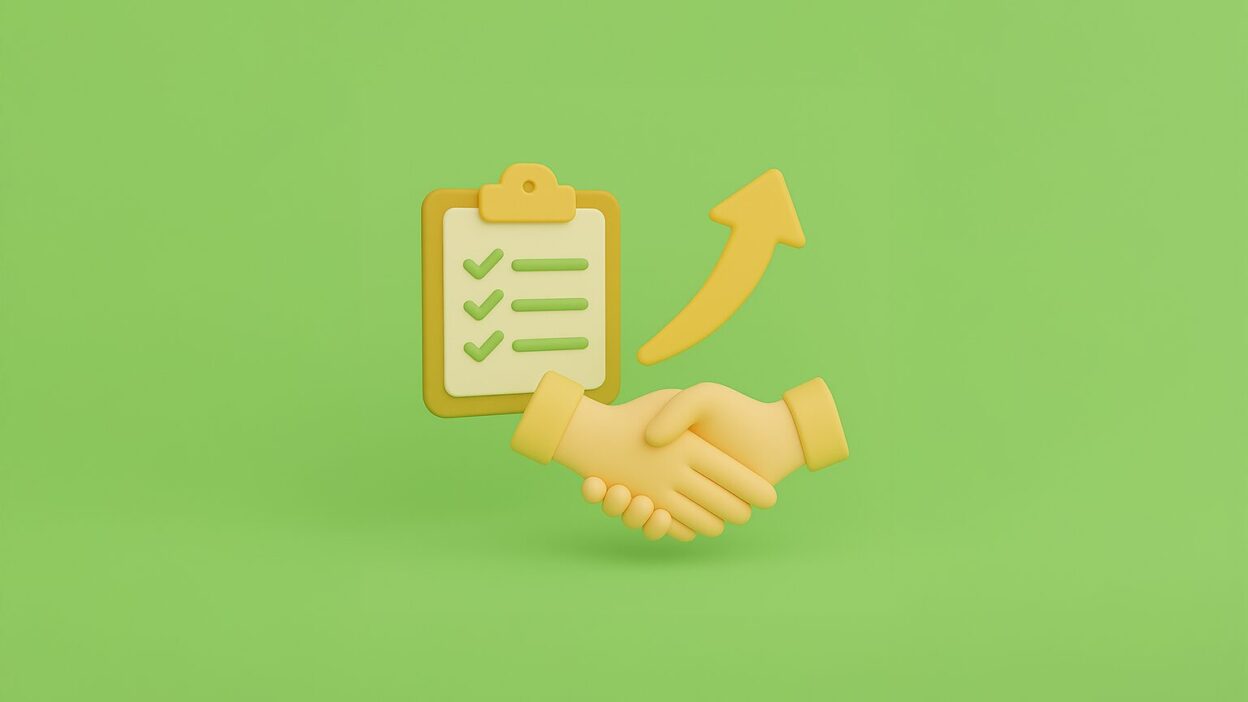The relationship with your suppliers is one of the most important aspects to consider when optimizing your company’s performance. Suppliers play a crucial role in the success of your business, as they provide you with the raw materials or products you need to manufacture your products or services. A solid, optimized relationship with your suppliers can contribute to your company’s operational efficiency, while a neglected relationship can lead to negative consequences – and that’s not what we’re looking for! In this article, we’ll share with you seven tips for optimizing your supplier relationship, and thus enabling you to gain in competitiveness. Let’s get started!
What are supplier relations?
The supplier relationship is the set of interactions and exchanges that take place between your company and the suppliers of goods or services with whom you work. This relationship is vital to your company’s success, as it can have a direct impact on the quality of your products and services, your profitability and your brand image. Among other things, you need to try to establish and maintain positive, productive relationships with your external partners. This means working closely with them,providing them with clear and precise information about your needs and expectations, respecting the terms and conditions of your contracts, communicating regularly and managing conflicts quickly and effectively.
In short, the supplier relationship is essential to the smooth running of your business, and managing it is a key element of your procurement strategy. By applying the practical advice in this guide, you can improve the quality of your products and services, reduce costs and increase your company’s return on investment.
How can I improve relations with my suppliers?
Clear and regular communication with your suppliers is essential to maintaining a healthy and effective relationship. Good communication ensures that both parties are on the same wavelength, avoiding misunderstandings and ordering errors. On the other hand, regular communication can strengthen the relationship between you and your suppliers. It can help you better understand their needs and expectations, while enabling you to share your own objectives and challenges. By dealing with issues quickly and effectively, you can demonstrate your commitment to the relationship, improve the quality of the products or services you receive, and even secure additional benefits such as discounts or special offers.
Establish clear and regular communication with your suppliers
One of the key elements of a good relationship with your suppliers is clear and regular communication. Clear communication can help avoid misunderstandings, late deliveries and ordering errors. In addition, regular communication helps to maintain a close relationship with your suppliers and to deal quickly with emerging issues.
Why establish healthy communication with my suppliers?
Good communication between all parties can strengthen the relationship between you and your suppliers. It can help you better understand their needs and expectations, while enabling you to share your own objectives and challenges. By dealing with issues quickly and effectively, you can demonstrate your commitment to the relationship, improve the quality of the products or services you receive, and even secure additional benefits such as discounts or special offers.
How can I establish effective communication with my suppliers?
To establish effective communication with your suppliers, you need to set up simple communication channels. Depending on the situation, you may choose to communicate by e-mail, telephone or videoconference. It’s also important to appoint a main point of contact for each supplier to facilitate communication and ensure that all parties are on the same wavelength.
Avoid late payment
Late payment is one of the most common problems in your partnership with suppliers. Late payments can have negative consequences for both your company and your suppliers. Indeed, late payment can lead to cash flow difficulties for your supplier, which in turn can affect the quality of the products or services supplied. Late payment can also affect your own business, causing delays in deliveries and reducing your suppliers’ confidence in you. Payment deadlines must be respected in order to promote good collaboration.
What are the consequences of late supplier payments?
In the event of late payment, suppliers may be forced to take legal action to obtain payment of their invoices, which may result in additional costs for your company. What’s more, repeated late payment can damage your company’s reputation and deter potential business partners. So it’s important to establish a clear payment policy and ensure that payments are made on time. In the event of temporary financial difficulties, it is also advisable to communicate with suppliers and find joint solutions to avoid late payment. This can help maintain a relationship of trust and collaboration over the long term.
How can I avoid late payment with my suppliers?
To avoid late payments, you can set up a clear payment policy and respect agreed payment terms. You can also consider alternative financing solutions to improve your cash flow and avoid late payments.
Respect your contractual commitments
Contractual commitments are legally binding agreements between two parties – in this case, you and your suppliers – that define the terms and conditions of your business relationship. Contracts are generally used to establish prices, quantities, delivery times, payment terms, guarantees and responsibilities in terms of quality and after-sales service.
What are the risks if I don’t respect my contractual commitments?
Respecting your contractual commitments is crucial to maintaining a healthy and fruitful relationship with your suppliers. Failure to respect contractual terms can lead to disputes, delivery delays, additional costs and a loss of confidence on the part of your supplier. On the other hand, by respecting your contractual commitments, you can strengthen trust and collaboration with your suppliers. This can lead to longer-lasting, more mutually beneficial business relationships. It’s also important to take into account the management of risks incurred in the business relationship with your suppliers, in particular by assessing potential risks and putting measures in place to minimize them.
How can I meet my contractual commitments with my suppliers?
To meet your contractual commitments, you can set up supply chain management processes to track the status of your orders and deliveries. It’s also important to communicate effectively with your suppliers and take into account their constraints in order to meet delivery deadlines.
Be transparent with your suppliers
Transparency is considered an important value, as it helps to maintain an honest and fair relationship based on mutual trust. Indeed, when you are transparent with your suppliers by sharing key information about your company, it can help to strengthen the relationship with them.
Why should I share my objectives with my suppliers?
Transparency is an important value in the relationship with your suppliers. You can be transparent with your suppliers by sharing key information about your business, such as order volumes, sales forecasts and strategy changes, which can help your suppliers better understand your needs and adjust their production accordingly. By sharing this information, you can also set clear expectations with your suppliers and avoid misunderstandings in the future.
How can I share my objectives with my suppliers?
To be transparent with your suppliers, you can set up regular meetings to share information on orders and sales forecasts. You can also use tracking tools to provide your suppliers with real-time information.


Involve your suppliers in your purchasing strategy
Involving suppliers in your purchasing strategy can have a significant impact on your relationship. By involving your suppliers in your purchasing strategy, you can benefit from their knowledge and expertise to improve the quality of your end products, and thus enhance your company’s performance.
Why involve my suppliers in my purchasing strategy?
Successful supplier involvement can lead to greater flexibility and responsiveness on their part, as well as lower costs for your company. Suppliers can also help identify new opportunities for innovation and growth for your company, bringing innovative ideas and solutions to the table.However, to get the most out of the relationship with your suppliers, it’s important to establish clear and transparent communication throughout the purchasing process. It’s also crucial to maintain a mutually beneficial relationship by treating suppliers fairly and with respect.
How can you involve your suppliers in your purchasing strategy?
To involve your suppliers in your purchasing strategy, you can organize joint working sessions to discuss purchasing objectives and plans. You can also ask your suppliers to suggest product improvements for optimum cost reduction or quality improvement on your behalf.
Regularly evaluate your suppliers’ performance
This evaluation enables you to measure the quality of the products or services supplied, as well as on-time delivery and the level of service provided. It can also help you identify potential problems and take corrective action to improve relations with your suppliers.
Why should I regularly evaluate my suppliers’ performance?
In addition to measuring your suppliers’ performance, regular evaluation can also enhance transparency and communication between your company and your suppliers. It can enable frank and open discussion of mutual expectations and opportunities for improvement.
How can I regularly assess my suppliers’ performance?
To regularly assess your suppliers’ performance, you can use key performance indicators (KPIs) to measure product or service quality, delivery times and service levels. You can also organize regular meetings to discuss performance and corrective actions.
Encourage collaboration rather than confrontation
There are several strong arguments in favor of a collaborative rather than a confrontational relationship with suppliers: firstly, working in collaboration with suppliers enables you to benefit from their know-how and expertise. Indeed, suppliers may have in-depth knowledge of their field of activity, and can contribute innovative ideas to improve the quality of your products or services. They may also be able to advise you on the latest market trends or regulatory developments, helping you to anticipate change and adapt more quickly.
What are the benefits of good collaboration with my suppliers?
Collaboration fosters a relationship of trust and transparency between you and your suppliers. This relationship of trust is essential to guarantee the quality of the products and services delivered, and to avoid potential disputes. It can also help you to negotiate more advantageous contracts and benefit from more flexible payment terms, while working with your suppliers can enable you to create solid, lasting partnerships. These partnerships can benefit your business in the long term, helping you to meet future challenges and the changing needs of your customers.
How can I establish a win-win relationship with my suppliers?
To foster a collaborative relationship, you can organize events or team-building activities with your suppliers. You can also build trusting relationships by sharing information about your business and listening to your suppliers’ concerns and needs.
Use a supplier relationship management (SRM) platform
Using a Supplier Relationship Management (SRM) platform can be a tremendous asset to your company in the process of improving your SRM. Here are a few benefits to consider:
- Data centralization: A Supplier Relationship Management platform centralizes all supplier information, making it easier to manage supplier relationships. All information is stored in one place, making it easier to access and use.
- Automated management processes: certain repetitive tasks, such as order creation, contract management and performance evaluation, can be automated. This saves time and reduces errors.
- Improved collaboration: a supplier relationship management platform enables more effective real-time collaboration between different company stakeholders, such as buyers, procurement managers, legal departments and so on. This enables them to work together more effectively to improve supplier relationships.
- Data analysis : Data from the tool can be analyzed in depth, including supplier performance, enabling areas for improvement to be identified and appropriate action plans drawn up.
- Cost reduction: By using a SRM platform, you can reduce the costs associated with managing supplier relationships, by automating processes, avoiding errors and making informed decisions based on data analysis.
Using SRM software is a competitive advantage: you can improve the quality of supplier relationships and maximize added value for your company. This will enable you to work more effectively with suppliers and strengthen your market position. The relationship with your suppliers is essential to your company’s success.
By following these tips, you can optimize this relationship and get the most out of it. Remember that the key to successful supplier management is open and transparent communication, a collaborative approach and a willingness to build lasting supplier relationships based on trust and mutual respect. It’s important to keep in mind that the relationship with your suppliers is a long-term one .
FAQ
How can I find new suppliers?
To find new suppliers, you can search online, ask for recommendations from colleagues or partners, or attend trade shows and networking events. It’s important to verify the quality of potential suppliers by examining their reputation, track record and certifications.
How to manage conflicts with a supplier?
To manage conflicts with a supplier, it’s important to keep communication open and transparent. Try to understand the supplier’s point of view and find a management solution that suits all parties. If the conflict persists, you may consider working with a third party to resolve the dispute.
How do you negotiate prices with your suppliers?
To negotiate prices with your suppliers, you need to be well informed about production and distribution costs. Try to negotiate discounts based on purchase volumes, the duration of the contract and the quality of the products or services supplied. It’s important to take a collaborative approach and seek mutually beneficial common ground.
How can I cut costs when working with suppliers?
To reduce costs when working with suppliers, you can look to optimize the supply chain, by eliminating unnecessary steps and reducing storage costs. You can also seek to reduce production costs by working with suppliers who offer innovative technologies and processes.
How can you guarantee the quality of products or services supplied by your suppliers?
To guarantee the quality of products or services supplied by your suppliers, you can establish clear and precise quality standards, and carry out regular audits to check that these standards are being met. You can also establish open and transparent communication with your suppliers to resolve quality issues quickly and efficiently.
Want to learn more about our Weproc procurement management software?
Contact us or request your 15-minute demo below!










